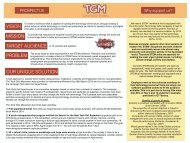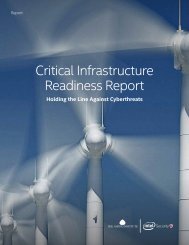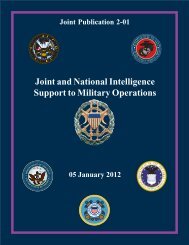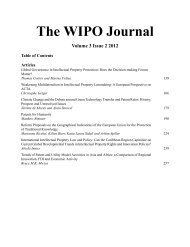Transparency Initiative (EITI)
2eoch1l
2eoch1l
You also want an ePaper? Increase the reach of your titles
YUMPU automatically turns print PDFs into web optimized ePapers that Google loves.
45<br />
5.2.1 FISCAL TRANSPARENCY<br />
``<br />
A number of examples for the contribution of national<br />
<strong>EITI</strong> processes to improved fiscal transparency and accountability<br />
are given, though often with weak empirical<br />
evidence.<br />
COVERING THE STANDARD 2013:<br />
The study of Rich/Moberg (2015: 73) concludes when referring<br />
to government (in the case of Nigeria) or company data<br />
(in the case of Iraq) that “governments' capacities to assess<br />
and improve their revenue collection processes have<br />
increased”.<br />
Bickham (2015) assesses the contribution of the <strong>EITI</strong> to<br />
transparency and accountability from the perspective of<br />
the extractive industry itself. The study states that mining<br />
companies rate the impact of the <strong>EITI</strong> in their countries<br />
as predominantly positive, particularly due to its efforts of<br />
“increased cooperation” and “‘lifting of the mystery’ around<br />
revenue flows” (p. 22), which, for instance in the case of Indonesia,<br />
allegedly led to more willingness “to share information<br />
around payments and production volumes”. Bickham<br />
concludes that the <strong>EITI</strong> “has played a significant part<br />
in changing attitudes towards transparency and accountability<br />
in the management of resource revenues” and thus<br />
has “helped build dialogue and increase trust” between<br />
companies and governments (p. 29). Two issues that need to<br />
be added from the private sector perspective are on the one<br />
hand its interest not only to publish more and more data,<br />
but to disclose adequately contextualized and presented<br />
data in order to provide for sufficient understanding by<br />
all stakeholders (RCS Global 2015: 18). On the other hand,<br />
as concluded in the Scanteam report from 2015 (p. 28), governments<br />
rather than extractive industries show resistance<br />
to disclose information, as “the public is usually not aware<br />
of the sums [they] pay to the state – and what happens to<br />
these amounts in corrupt environments”.<br />
Scanteam (2015: 34) comes to the conclusion that in Ghana<br />
“improved transparency and timeliness of royalty disbursements<br />
are clearly due to GH<strong>EITI</strong>’s RRs [ann.: Reconciliation<br />
Reports], and the reduced opportunities for waste and<br />
corruption are also due to RRs documenting the systemic<br />
weaknesses regarding royalty revenues directed to local<br />
level”. However, the report does not explain how it came to<br />
that conclusion. Moreover, the statement that “GH<strong>EITI</strong> itself<br />
does not generate data that can be used to track changes<br />
to transparency” (p. 50) makes the finding questionable.<br />
BEFORE THE STANDARD 2013:<br />
Regarding Ghana some evidence can be found elsewhere, as<br />
in the study from Wilson/van Alstine (2014: 32) that mentions<br />
the enactment of the Petroleum and Revenue Management<br />
Bill in 2011 as a major achievement since the civil<br />
society appeared to be intensely involved in its formulation.<br />
Similar findings can be found in the Scanteam report from<br />
2011 (p. 10), which is based on case studies in Nigeria, Gabon<br />
and Mongolia. For the case of Nigeria, <strong>EITI</strong> reports are<br />
highlighted to be an important instrument for providing<br />
“detailed data and considerable insights in a sector”. However,<br />
their use and validity is challenged as they are considered<br />
to be too “sporadic and late”, and furthermore are only<br />
based on audited company statements (p. 15). Also in the<br />
case of Gabon, timeliness and regularity of reconciliation<br />
reporting is rated unsatisfactory. Still the fact alone that information,<br />
regardless of its timing and reliability, was made<br />
available for the public is rated as a step towards more<br />
transparency (p. 16f). In the case of Mongolia eventually,<br />
while the data is assessed to be sufficiently reliable, the distribution<br />
and dissemination of information is considered<br />
to be insufficient, due to limited capacities of the National<br />
Secretariat (p. 20). Given these results, the report summarizes<br />
that <strong>EITI</strong> reports provide substantial information about<br />
tax payment and government revenues. However, their<br />
scope is yet too limited to contribute to more transparency<br />
about the governments’ public financial system in general.<br />
A rather critical assessment of the <strong>EITI</strong>’s contribution to<br />
transparency can be found in Sovacool/Andrews (2015: 186,<br />
referring to Shaxson 2008 and Le Billon 2011) who assert<br />
that since the <strong>EITI</strong> “focuses only on revenues from the extractive<br />
industries” it only “takes a narrow view of transparency,<br />
as it is only a small part of public sector revenues”.<br />
Furthermore, it is unable to “monitor or track illicit financial<br />
flows”, which makes it impossible to “influence resource<br />
revenue that is pocketed or illegitimately transferred<br />
for peoples’ private benefit”. Finally, since the <strong>EITI</strong> follows<br />
a voluntary approach, governments may not ad-here to its<br />
principles of transparency. The <strong>EITI</strong> briefing from Westenberg/George-Wagner<br />
(2015: 13) supports this assumption<br />
by declaring that only six of 22 reports, prepared under the<br />
<strong>EITI</strong> Standard provided links to contracts between the government<br />
and the private sector that provide the terms of<br />
the exploitation of oil, gas and minerals, which is an explicit<br />
recommendation in the <strong>EITI</strong> Standards (3.12).









